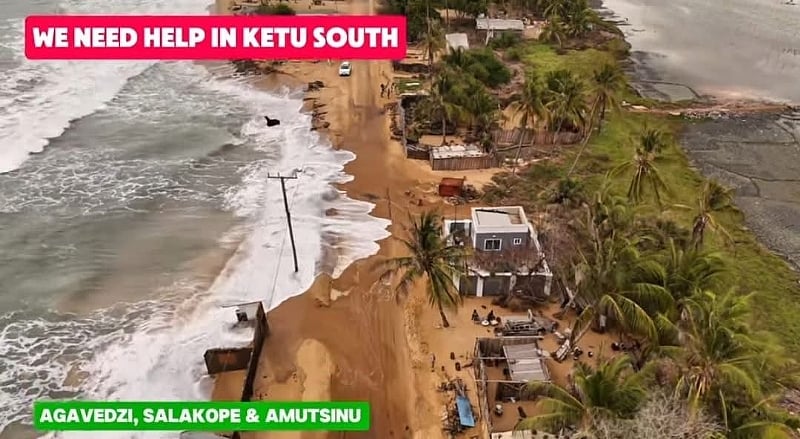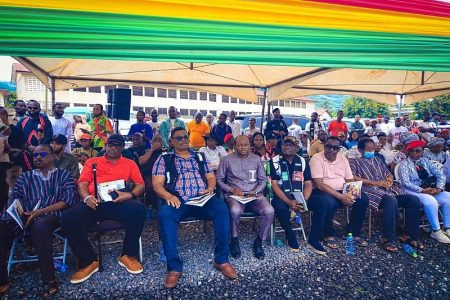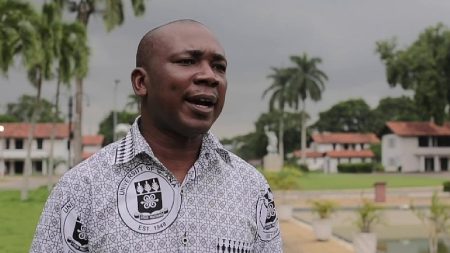Ebenezer Madugu, a prominent broadcast journalist and news anchor at Atinka TV, has issued an urgent plea to the Ministry of Tourism and the Volta Regional Minister to address the persistent and devastating tidal wave crisis in Keta. He argues that the much-touted VisitVolta tourism campaign risks becoming a hollow exercise if the government fails to take immediate and decisive action to protect the region’s vulnerable coastline. Madugu’s concern stems from the lack of tangible progress despite President Mahama’s visit to the affected area in March and his subsequent promises of swift intervention. The ongoing threat of tidal waves, particularly in Agavedzi and surrounding communities, continues to disrupt lives and livelihoods, casting a shadow over the region’s tourism potential.
Madugu highlights the stark reality facing these coastal communities. The absence of effective mitigation measures leaves them perpetually vulnerable to the destructive power of the sea. He warns that if the encroaching tides are not addressed, the consequences could be catastrophic, potentially submerging vast swathes of land, including major communities and vital tourist attractions. The geographical characteristics of the region exacerbate the risk, with the potential for floodwaters to penetrate deep inland, impacting a significant portion of the Volta Region. Keta, a town of historical and cultural significance, and a key pillar of the region’s tourism narrative, stands to suffer disproportionately if preventative measures are not implemented.
The VisitVolta campaign, designed to showcase the region’s natural beauty, cultural heritage, and eco-tourism offerings, is undermined by the looming threat of environmental disaster. Madugu emphasizes the irony of promoting the region’s pristine environment and tranquil atmosphere while ignoring the urgent need to protect it from the destructive forces of nature. He stresses the importance of the Volta Region as a haven of tranquility and natural beauty – a place where the air is clean and the landscape is verdant. However, the idyllic image projected by the campaign rings hollow against the backdrop of preventable climate-related disasters that threaten to erode the very essence of what makes the region so appealing.
Madugu’s appeal goes beyond simply highlighting the environmental and social implications of the tidal wave crisis; he emphasizes the economic consequences as well. The recurring floods displace residents, damage infrastructure, and disrupt crucial economic activities like fishing and tourism, the very sectors the VisitVolta campaign aims to bolster. The long-term damage to the region’s economy, if these issues remain unaddressed, will far outweigh any short-term gains from tourism promotion. He believes that investing in robust coastal defenses is not merely an expenditure but a crucial investment in the region’s future, safeguarding not just its natural beauty but also the livelihoods of its people.
The Keta tidal wave issue is not a new phenomenon; it has plagued the region for decades. Despite repeated calls for action from experts, civil society groups, and affected communities, a comprehensive and sustainable solution remains elusive. Madugu’s intervention re-energizes the conversation and puts renewed pressure on the government to acknowledge the severity of the problem and take concrete steps to address it. The decades-long struggle highlights a persistent disconnect between government rhetoric and action. While campaigns like VisitVolta promote a rosy picture of the region, the underlying reality of recurring environmental crises exposes the inadequacy of existing measures and the urgent need for a long-term, sustainable solution.
Madugu’s public appeal is not just a call for immediate action; it is a call for accountability. He challenges the government to demonstrate its commitment to the well-being of the people and the preservation of the Volta Region’s natural heritage. By connecting the tidal wave crisis to the VisitVolta campaign, he underscores the hypocrisy of promoting tourism while neglecting the fundamental environmental challenges that threaten the very essence of what makes the region a desirable destination. His words resonate with the growing public sentiment that demands not just promises but concrete action to protect vulnerable communities and ensure a sustainable future for the Volta Region. He urges the government to prioritize the long-term well-being of both the environment and the people who depend on it, recognizing that a thriving tourism sector can only exist in a healthy and resilient ecosystem.














